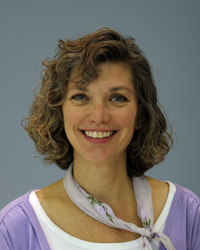Kim Orth‚Äôs efforts ‚Äėnothing short of dazzling‚Äô
Kim Orth, professor of molecular biology at the University of Texas Southwestern Medical Center at Dallas, has been named the winner of the 91”įŅ‚ and Molecular Biology Young Investigator Award.
 Kim Orth
Kim Orth
About the award
The 91”įŅ‚Young Investigator Award (formerly the ASBMB/Schering-Plough Research Institute Award) recognizes outstanding research contributions to biochemistry and molecular biology. The recipient must have no more than 15 years postdoctoral experience. The award consists of a plaque, $5,000, transportation, and expenses to present a lecture at the 2012 91”įŅ‚annual meeting.
Orth received the award in recognition of her seminal discoveries of the molecular mechanisms that virulence factors from pathogenic bacteria (including those responsible for the plague and food poisoning) use to manipulate host cell signaling systems to promote infection. These bacterial factors disrupt the host’s defense mechanisms, allowing the bacteria to survive and replicate by tipping the balance of homeostatic signaling pathways in favor of the invading pathogen.
For Eric Olson, also from UT-Southwestern, Orth’s work “represents a unique convergence of biochemistry and cellular biology with the basic mechanisms of infectious disease.” Jack Dixon, vice president and chief scientific officer at the Howard Hughes Medical Institute, agreed. “Kim’s efforts were nothing short of dazzling,” he said.
“I feel extremely honored to win such a prestigious award for our scientific endeavors,” said Orth. “I credit much of this success to the skilled people I have had the privilege to mentor, the first-class, collegial environment at UT-Southwestern, and my supportive friends and family.” A scientist to the bone, Orth also made sure to credit the “clever bacterial pathogens that evolved magnificent mechanisms to manipulate cellular signaling and who make science so much fun.”
After an undergraduate career at Texas A&M University, Orth received her master’s in biological chemistry at the University of California, Los Angeles, before moving to UT-Southwestern, where she spent three years as a research associate before beginning her Ph.D. program, which she finished in 1995. After a postdoctoral fellowship at the University of Michigan, Orth returned to UT-Southwestern in 2001, where she has been ever since.
Orth will receive her award during the Experimental Biology 2012 conference in San Diego, where she will deliver an award lecture. The presentation will take place at 2:55 p.m. April 24 in the San Diego Convention Center.
Enjoy reading 91”įŅ‚Today?
Become a member to receive the print edition four times a year and the digital edition monthly.
Learn moreGet the latest from 91”įŅ‚Today
Enter your email address, and we’ll send you a weekly email with recent articles, interviews and more.
Latest in People
People highlights or most popular articles

From dust to discovery
From makeshift classrooms in Uganda to postdoctoral research in Chicago, MOSAIC scholar Elizabeth Kaweesa builds a legacy in women’s health.

Fliesler wins scientific and ethical awards
He is being honored by the University at Buffalo and the American Oil Chemists' Society for his scientific achievements and ethical integrity.

Hope for a cure hangs on research
Amid drastic proposed cuts to biomedical research, rare disease families like Hailey Adkisson‚Äôs fight for survival and hope. Without funding, science can‚Äôt ‚Äúcatch up‚ÄĚ to help the patients who need it most.

Before we’ve lost what we can’t rebuild: Hope for prion disease
Sonia Vallabh and Eric Minikel, a husband-and-wife team racing to cure prion disease, helped develop ION717, an antisense oligonucleotide treatment now in clinical trials. Their mission is personal ‚ÄĒ and just getting started.

91”įŅ‚members recognized as Allen investigators
Ileana Cristea, Sarah Cohen, Itay Budin and Christopher Obara are among 14 researchers selected as Allen Distinguished Investigators by the Paul G. Allen Family Foundation.

AI can be an asset, 91”įŅ‚educators say
Pedagogy experts share how they use artificial intelligence to save time, increase accessibility and prepare students for a changing world.

